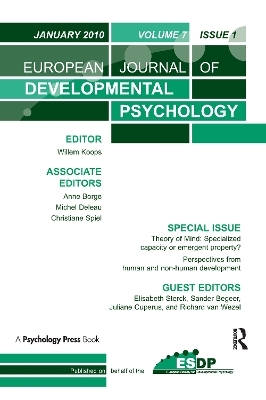
Theory of Mind: Specialized Capacity or Emergent Property? Perspectives from Non-human and Human Development
Psychology Press Ltd (Verlag)
978-1-84872-731-1 (ISBN)
Theory of Mind, the cognitive capacity to attribute emotions, intentions and knowledge to oneself and others, has been claimed a hallmark of human cognition. Nonetheless, Theory of Mind is considered limited in young children and people with autism. Moreover, its presence in animals is much investigated, and hotly debated. Essential for cross-disciplinary discussions and real insight in this unique capacity is knowing what constitutes Theory of Mind. We aim to tackle this by combining insights from three different scientific fields that study Theory of Mind: animal behaviour, typical child development and developmental disorders such as autism and AD/HD.
Elisabeth Sterck, Utrecht University, The Netherlands Sander Begeer, VU University Amsterdam, The Netherlands Juliane Cuperus, Sint Marie. The Netherlands Richard van Wezel, Utrecht University, The Netherlands
E.H.M. Sterck, S. Begeer, Theory of Mind: Specialized Capacity or Emergent Property? Part 1. Nonhuman Development. J.M. Dally, N.J. Emery, N. S. Clayton, Avian Theory of Mind and Counter Espionage by Food-Caching Western Scrub-Jays (Aphelocoma californica). S.E. Koski, E.H.M. Sterck, Empathic Chimpanzees: A Proposal of the Levels of Emotional and Cognitive Processing in Chimpanzee Empathy. Part 2. Human Development. P. Mitchell, M. Bennett, U. Teucher, Do Children Start Out Thinking They Don't Know Their Own Mind? An Odyssey in Overthrowing the Mother of All Knowledge. M.P. Ketelaars, J.M. Cuperus, K. Jansonius, M. van Weerdenburg, L. Verhoeven, Dynamics of the Theory of Mind Construct: A Developmental Perspective. Part 3. Pathological Human Development. S. Begeer, B.F. Malle, M. Nieuwland, B. Keysar, Using Theory of Mind to Represent and Take Part in Social Interactions: Comparing Individuals with High-functioning Autism and Typically Developing Controls. H. Roeyers, E. Demurie, How Impaired is Mind Reading in High-functioning Adolescents and Adults with Autism. H.M. Geurts, M. Broeders, M.S. Nieuwland, Thinking Outside of the Executive Functions box: Theory of Mind and Pragmatic Abilities in Attention Deficit Hyperactivity Disorder.
| Erscheint lt. Verlag | 8.11.2010 |
|---|---|
| Reihe/Serie | Special Issues of the European Journal of Developmental Psychology |
| Verlagsort | Hove |
| Sprache | englisch |
| Maße | 156 x 234 mm |
| Gewicht | 280 g |
| Themenwelt | Geisteswissenschaften ► Psychologie ► Entwicklungspsychologie |
| ISBN-10 | 1-84872-731-3 / 1848727313 |
| ISBN-13 | 978-1-84872-731-1 / 9781848727311 |
| Zustand | Neuware |
| Haben Sie eine Frage zum Produkt? |
aus dem Bereich


